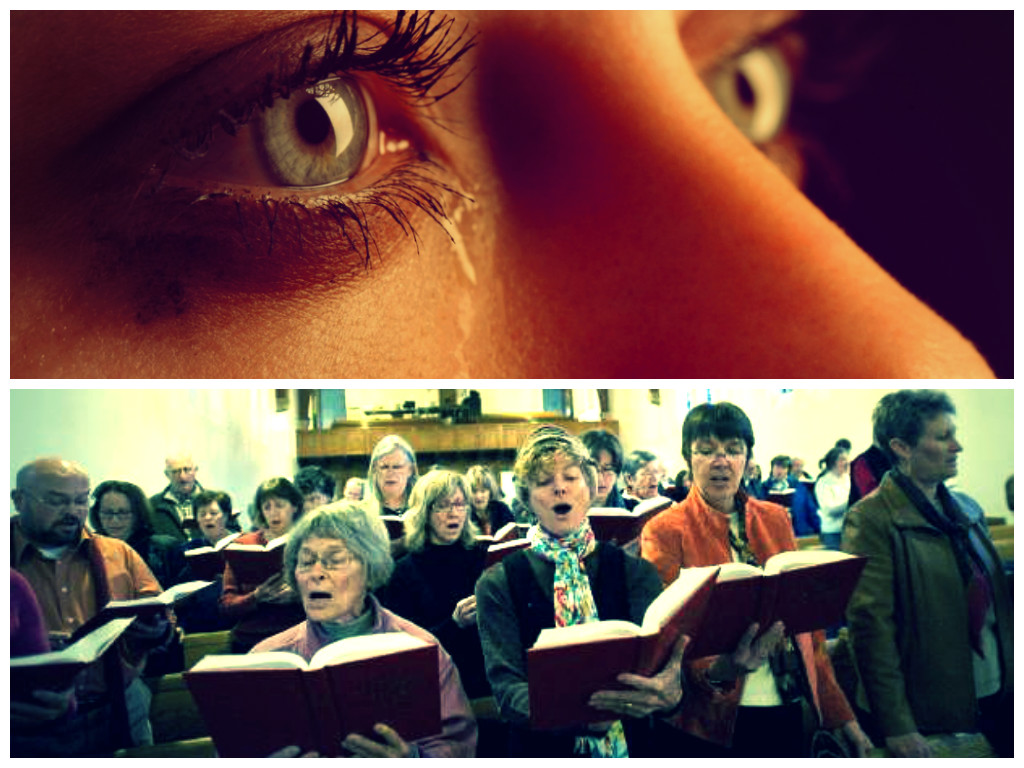
by Karen Lichlyter-Klein
I love music. I grew up as a musician and continue to sing as much as I can, though it is harder and harder to find places to do so. My mother is a composer, and she immersed all of us in music from an early age- piano, guitar, harp, violin, flute, voice lessons, choirs, ensembles, casts in musicals- she pressed music into us… hard.
My church growing up loved music too. At least hymns. This was back when they had Sunday night worship as well as Sunday morning. So after a whole morning at church, we would have a few hours to finish homework and eat soup for dinner before heading back to church. I usually did not like going to the Sunday evening service, except once a month they would have a hymn sing instead of a sermon. This I liked. We would get to call out our favorite hymns and I would always try to pick “Wonderful Grace of Jesus” because I liked to hit the high notes: “Oh magnify the pre-cious name of Jeeee-sus, PRAAAAISE (usually a high G) his naaaame!” It was great fun for me, and it meant not having to listen to someone talk for 30 minutes. (Little did I know God would end up calling me to be one of those people who preaches now. He’s got a weird sense of humor.)
Inevitably, for a young girl, the hymn sings would lose their glamour. And as I became a pre-teen, I would find myself bored by singing in church. That’s when my mother intervened. On a rare day when she wasn’t eyeing us with a stern look from the choir loft as we four children sat alone wiggling our way through the church service, she stood next to me as we sang that Sunday morning. I always loved listening to my mother sing. From as young as I can remember her voice mesmerized me. Some of my favorite memories are of lying in bed with the lights out, drifting to sleep to the sound of her voice and the piano as she wrote another piece of music.
Normally, as a pre-teen girl, I would rather be dead than sitting next to my mother in worship, but if it meant hearing her alto voice on the harmony and trying with all my might to match her tone with my soprano, I was willing to make a sacrifice of my ego for that hour. But despite my love of her voice, I was going through a hymns-are-boring-and-I-hate-them-with-the-fires-of-a-thousand-hells phase. (Did I mention pre-teen girls are quite dramatic at times?) I complained to her as I dragged my body to stand up, “These hymns are so boring!”
My mother turned and looked at me, and rather than the expected scolding, she said, “That’s ok. Sometimes they are. Maybe that’s the time you start listening to the words. You don’t have to sing, just listen to the words.” So I did. And it transformed my worship experience. I found myself wondering what “wert” was in Holy, Holy, Holy. I had to look up the meaning of “here I raise an Ebenezer, daily by thy help I’m come.” I worked hard to translate the strange grammar and words and rhyme to understand what the hymns were saying. Without knowing it, my mother had turned me into a theologian at a young age.
This appreciation for hymns then expanded into other forms of sacred worship. Eventually, I went on to seminary and studied under professors who also saw the theology of music and worship, and who helped me articulate the narrative of God’s work in songs. Those same professors gave me tools to use as a pastor to evaluate music in all its various forms in order to understand what I was causing others to sing- to profess or confess in song- and how to, as a pastor, offer music responsibly to my congregation.
And music continued to be a healing to my soul. God spoke to me in lyrics. He still does. I find my spirit singing a song that I didn’t think of… it just floods up from somewhere without notice or warning, and I usually know it’s the Holy Spirit’s voice speaking something to me, driving me back to the theology of whatever song I am singing… and from there to the scripture from which that theology is born. Singing was a way of breathing for me. A way of understanding and interpreting the world. Various songs, hymns, and spiritual songs marked my pathway through life.
Until the day came when I couldn’t sing.
Back in the darkest time of my life- those 18 months of loss- after so many traumas and griefs and stresses and fears, I found one day that I couldn’t sing. The music in worship was either too disconnected from my experience- it’s incredibly difficult to sing a celebration song when lamenting- or it was too raw and personal to sing. I felt like I had already given up my child, my health, my future… the last thing I wanted to sing was about giving myself even more to a God I wasn’t too sure about. The words mattered too much to me to sing them blithely. I knew that God would hear what I said in those words, and I wasn’t sure I wanted that sort of responsibility.
Sometimes I couldn’t sing because singing could open a place deep inside- a place that usually stays locked, that place where we are most vulnerable and most moved. Some Sundays as I participated in worship waiting for my time to preach, I knew that if I opened my mouth to sing what would come out would be loud sobs that would cripple my ability to do what I was called to do that day.
Sometimes I couldn’t sing because I was so angry… so incredibly angry at a God who at the same time seemed so deeply present and shockingly absent.
Sometimes I couldn’t sing because grief has no song… deep grief that is. That sort of grief has only the agonizing silence that requires a Spirit to speak on our behalf… and the Bible says that even that Spirit groans with no words of his own.
I couldn’t sing. This piece of me, this piece so central to my engagement with God, was gone too. Another loss.
And in the silence of that loss, I learned something. I learned that while there may be many reasons we as a Christian community sing, one reason is often overlooked. That overlooked reason is this: we sing as a community because there will always be someone who can’t sing and must borrow our songs until he or she finds a voice again. When I couldn’t sing, I knew my people could. I knew that this person could vocalize the faith we shared when I had nothing to share. I knew that that person could sing the words I dared not say because I knew I would not mean them, but he could. I knew that my friend would be scouring the theology of every song on my behalf. And I knew the worship leader would be attentive to the pain of others in the way he chose songs.
When I couldn’t sing, my community could. And that mattered. A lot. Because they let me lean onto their faith for those few moments week after week. My voice couldn’t support the weight I carried at the time. But collectively theirs could.
There are many reasons why I despise worship wars and worship critics. But this is one of the main reasons for me. When we are so focused on what we don’t like about worship (and in this instance I mean music, though worship is far from just music), we forget that we may be singing for the person who can’t sing at that moment. In their pain, that person may need you to sing that song- the one that is so incredibly painful, too painful for them to articulate. When others are too racked with loss to do so, the community steps in as if to say, “We know you are struggling… so you can borrow our faith for the moment and we will speak what you cannot speak yet.” If we make music in worship about ourselves, who do we fail to care for in those sacred moments? Who do we overlook? Who leaves our communities feeling more burdened down because another worship experience stole from them the chance to lighten their load even for a just a few moments?
Eventually, my song returned. I don’t experience music in worship the same way I did before. Indeed, I don’t experience much the same as I did before! But I sing. I sing the songs of my people. I sing the songs that are difficult. I sing the songs that call me to greater responsibility, and I sing the songs that someone else might need to hear. I also pray for worship that creates spaces for people who, like me, just need the silence, the moment, the space to grieve, along with the community that will lift their burden for a short time… all the while singing God’s grace over them when they require it most.

Karen Lichlyter-Klein is a pastor, mother, wife, aspiring writer, leadership coach, sister, daughter, gardener, musician, worship planner, house cleaner, cook, friend, colleague, theologian, and preacher. She has served churches in Nebraska, Illinois and Colorado, and many pastors and leadership teams in transition or in need of growth and development. She is Ordained to Word and Sacrament in the Evangelical Covenant Church and has an M.Div. from North Park Theological Seminary. She blogs at Ordinary Sacred. This post was originally published in September 2013 and is republished with the permission of the author.


One Response to “When We Can’t Sing”